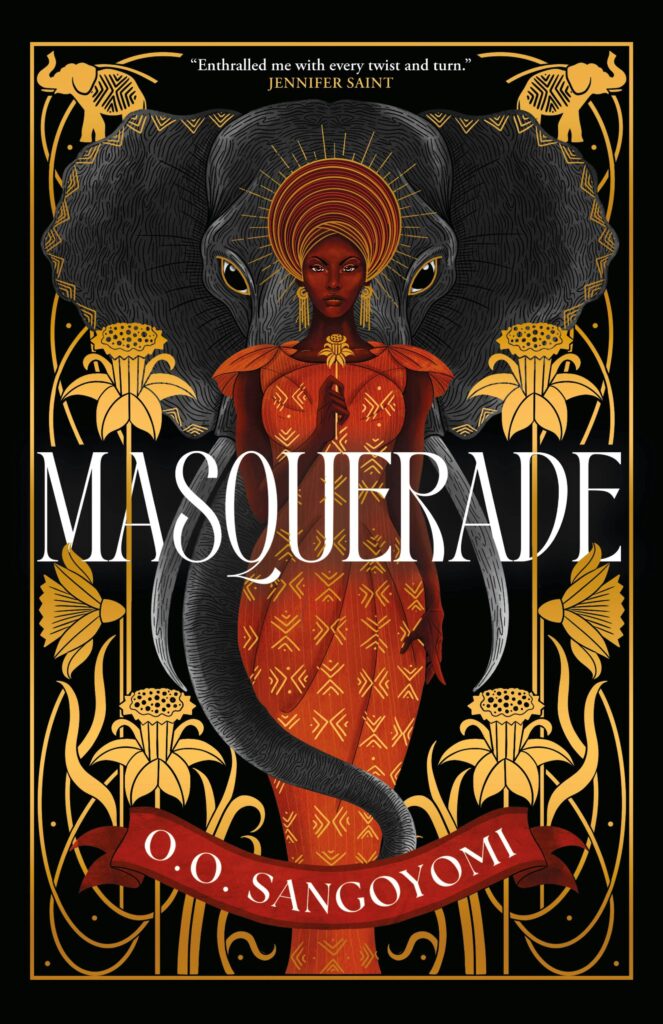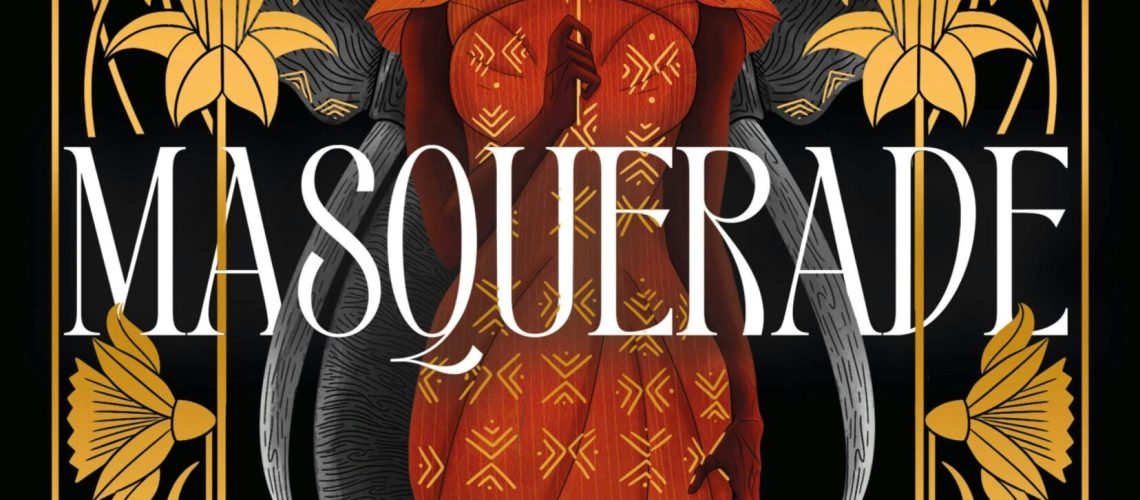O.O. Sangoyomi’s debut novel Masquerade is “loosely based on the myth of Persephone” according to the publisher, but that’s slightly misleading; although some plot elements echo the legend, and the protagonist believes in divine spirits (òrisàs) and has a few significant dreams, this book really isn’t what I’d call fantasy. It’s an interesting work of alternate history in which a naive young girl has to grow up fast when she is abducted and installed in a foreign court as the intended bride of a warrior king. Ignorant at first, Òdòdó learns fast that kindness can conceal cruelty, and tenderness can be a distraction from tyranny; eventually, she learns how to make allies and take control of her own life, and more.

The book opens in Timbuktu with the execution of a Songhai general after the city’s takeover by Yorùbáland. Òdòdó witnesses this, then returns to the blacksmith compound where she and her mother work; in this reimagined West Africa, all forge work is done by women, but these smiths are shunned as witches, a necessary and thus barely tolerated evil. Òdòdó crafts a daffodil from silver and gives it to an engaging tramp, but her mother drives away the beggar and slaps and scolds Òdòdó for talking to a strange man. Later, when she visits the market to sell more metal flowers, she is tricked, drugged, and kidnapped. She expects to be sold as a slave to work in a mine, but instead, she is transported to a life of luxury, for the stranger she’d been kind to turns out to have been the Yorùbá warrior king, Àrèmo the Alǻàfin. (Alǻàfin is a title that every Yorùbá king takes, like Pharaoh in Egypt.)
Initially, I was very puzzled as to why the king didn’t just marry Òdòdó through normal means, like offering a dowry. Did he literally “sweep her off her feet” as a grand gesture? He does like making those, but it turns out to be a lot simpler: The Alǻàfin just takes what he wants, whether it’s a person, slaves, or territory. But he is magnificent, and Òdòdó is dazzled by her new lush life, and she agrees that she’ll marry him as soon as he rescues her mama from poverty, too. That reunion is postponed for much of the book, though, because most blacksmiths disappear from the land, apparently in a sort of strike, soon after Òdòdó’s abduction.
Not having been raised to understand subtlety, Òdòdó gets tricked fairly frequently, at least in the beginning. She has many enemies at court, from a general who thinks she must have bewitched his ruler, to the king’s mother who thinks nobody is good enough for her son, to a complicated relationship with her husband’s first wife (a marriage of political alliance). But she quickly learns the value of information after her suitor is impressed by the utility of some gossip she repeats to him, and later she deliberately creates an information network of overlooked women, children, and slaves.
Despite her quickness in learning, and the intelligently creative solutions to problems that she offers at the advisory council meetings, most people dismiss her impact, and she constantly has to strive, submit, and scheme to keep her place in the court and in her suitor’s heart, as others undermine her. It’s repeatedly driven home to her that despite her high status, she has very little power … until she finally learns from Àrèmo how to take what she wants for herself.
Òdòdó turns out to be fairly ruthless, having scrabbled for survival and made some very hard choices; eventually, she decides to stop at nothing to achieve her goals. She does try kindness at first, but this brings her few rewards. However, when she finally finds her footing, it looks like she’ll be making good long-term decisions, helping the blacksmiths achieve fairer treatment and guiding the country toward more productivity and less aggression.
You don’t have to know anything about the Persephone myth to enjoy this book, but it’s interesting to pick up on the resonances: abduction, mystically significant cowpeas instead of pomegranate seeds, and the blacksmith strike/disappearance being like Demeter’s withholding of crops. Some things end up very differently from the myth, though, so be prepared for that.
I’ll admit I’m still a bit puzzled by the title of Masquerade. Does it refer to the king’s initial disguise as a pauper? The false faces some people wear at court? Òdòdó’s pretence of being submissive while she bides her time and builds her own power base?
I did suspect for a while that since the Alǻàfin always wears a mask and elaborate layers of clothing in public and at council meetings, Òdòdó might actually be planning to masquerade as him, but that didn’t happen after all. So readers, if any of you figure out the title, please let me know!
Content warnings: Violence, brutality, many deaths, including of significant characters and an animal; negatively portrayed sexism, discrimination, and oppression.
Disclaimers: I received a free ebook for review.
Publishing July 2, 2024; preorder at https://us.macmillan.com/books/9781250904294/masquerade .







